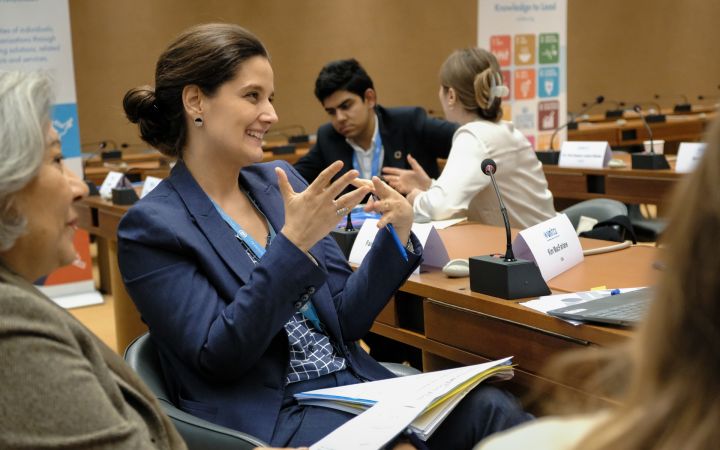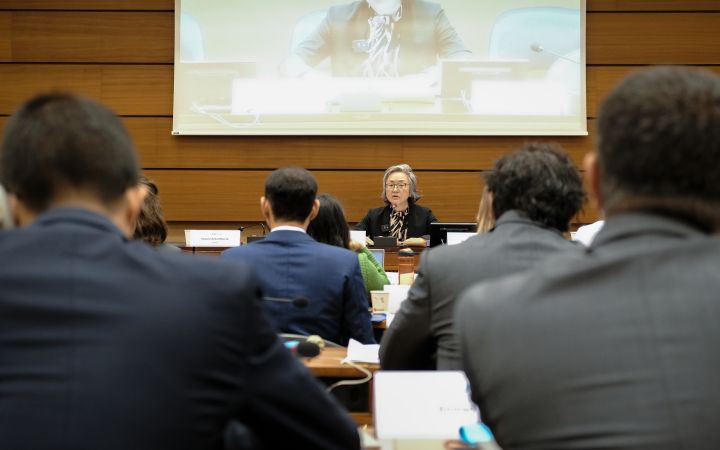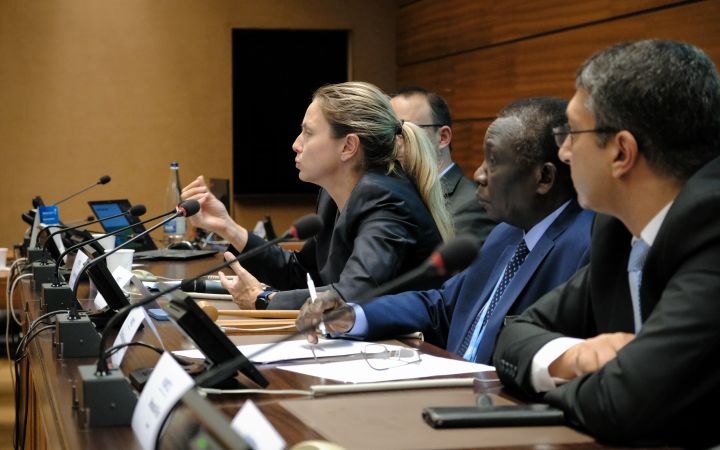UNITAR welcomed 20 government officials from 18 countries to a two-day AI Strategy Masterclass "Leading the AI Revolution - Strategy, Innovation, and Global Impact" at the Palais des Nations in Geneva.
6 November 2024, Geneva, Switzerland - The UNITAR AI Strategy Masterclass "Leading the AI Revolution - Strategy, Innovation, and Global Impact" took place at the Palais des Nations in Geneva on 24-25 October 2024, bringing together 20 global policymakers, high-ranking officials and diplomats from 18 countries. Led by AI expert Mr. Vedant Ahluwalia, the event offered strategic insights on responsibly harnessing AI's potential to address economic development, disarmament, and social progress.
UNITAR Division for Prosperity Director Ms. Mihoko Kumamoto emphasized AI's transformative role across global governance, education, climate, and security, stating,
AI is reshaping global governance. Leaders must adopt ethical and innovative approaches to policymaking to ensure AI drives sustainable development.
The two-day masterclass aimed to bridge knowledge gaps, offering an in-depth look at AI's implications and strategic applications. Participants engaged in sessions to enhance their ability to integrate AI into national and international policy frameworks.
The programme was held over two days:
Day 1 - Understanding the Future of AI: Participants explored AI's current landscape, focusing on its disruptive impact across commerce, education, and government. Discussions highlighted the urgent need for nations to upskill their workforces to navigate AI-driven transformations responsibly.
Day 2 - Strategy Building and Collaborative Solutions: On the second day, they focused on practical frameworks for AI adoption, with group exercises to develop strategic plans that address unique national challenges. Participants shared strategies to bridge the digital divide and discussed AI's role in sustainable development initiatives, including smart city planning, reimagining education models, and early warning systems.
Speakers and participants shared the current impacts of AI on diplomacy and governance. Ambassador of The Gambia, Professor Muhammadou M.O. Kah, expressed the significance of empowering diplomats with AI knowledge, stating,
Building capacity around AI for diplomats enhances our ability to negotiate effectively and advise governments on policy directions.
Ms. Larissa Guerra Figueiredo Karydakis, First Secretary Representative of Brazil, remarked, "[The AI Masterclass] participants recognize that multilateralism and international cooperation are crucial to taking opportunities and tackling challenges with emerging technologies, including AI."
Youth Engagement and Education in AI
In a notable session on AI and education, representatives from academia underscored the importance of involving young minds in the AI revolution. Ms. Judith Breuer, a student researcher of AI, highlighted the vital role of education in fostering meaningful youth engagement and innovation in AI as a pathway for innovation, stating,
Expanding information flow allows us to envision what's possible and what we can strive for in the future.
The diverse contributions highlight the need for youth-driven initiatives and educational programmes to create a more inclusive AI ecosystem that benefits all generations and fosters cross-sector collaboration.
A Call for AI-Empowered Diplomacy
The masterclass concluded with participant presentations on AI adoption strategies, focusing on Sustainable Development Goals and AI-driven solutions. Discussions underscored the importance of diplomatic efforts to leverage AI for equality and sustainable growth. Participants noted that understanding AI's role is vital for making data-informed decisions in multilateral settings.
Ambassador Alier Deng Ruai Deng of South Sudan thanked UNITAR for hosting the masterclass. He highlighted the value of ongoing AI education for government leaders and diplomats, stating, "We are decision makers who must advise our governments on AI applications to address the challenges our countries face." A life-long learner who has completed other UNITAR short courses. He encouraged UNITAR to continue creating learning events for diplomats, emphasizing the need for continual education to keep pace with AI advancements.
Ambassador Kah of The Gambia echoed this sentiment, noting the importance of building AI capacity within the diplomatic community. "Building capacity and competence [of] diplomats is crucial for effectively incorporating AI in negotiations and international policymaking," he said.
UNITAR remains committed to building a network of leaders equipped for responsible AI adoption. The AI Masterclass sets a foundation for diplomatic and policy-driven innovations, with participants well-prepared to shape a more peaceful, inclusive, and sustainable global future.










